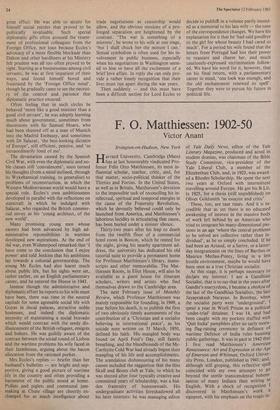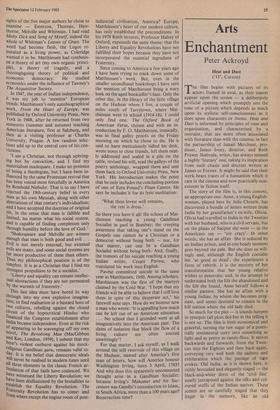F. 0. Matthiessen: 1902-50
Victor Anant
Irvington-on-Hudson, New York Harvard University, Cambridge (Mass) has at last honourably vindicated Pro- fessor Felix Otto Matthiessen, its most in- fluential scholar, teacher, critic, and, for that matter, socio-political thinker of the Thirties and Forties. In the United States, as well as in Britain, Matthiessen's devotion to the impossible task of reconciling his in- tellectual, spiritual and temporal energies in the cause of the Fraternity Revolution, which he devoutly believed could only be launched from America, and Matthiessen's laborious lucidity in articulating that cause, has been buried under a sinister silence.
Thirty-two years after his leap to death from the twelfth floor of a commercial hotel room in Boston, which he rented for the night, giving his nearby apartment ad- dress, the university has dedicated his old tutorial suite to provide a permanent home for Professor Matthiessen's library, manu- scripts and other memorabilia. The Mat- thiessen Room, in Eliot House, will also be available as a guest house for itinerant scholars, writers and artists who find themselves drawn to the Cambridge area.
The next February issue of Monthly Review, which Professor Matthiessen was mainly responsible for founding, in 1949, a year before his death, is to publish the first of two obviously timely assessments of the contribution of a 'Christian and a socialist believing in international peace', as his suicide note written on 31 March, 1950, defined his faith. His mangled body was found on April Fool's Day, still faintly breathing, and the bloodhounds of the Mc- Carthyite Cold War had already begun their mangling of his life and accomplishments. The scandalous dishonouring of his many causes included the suggestion that the elite Skull and Bones club at Yale, to which he was elected after four typically creative and committed years of scholarship, was a hid- den fraternity of homosexuals. His undergraduate activities foreshadowed all his later interests: he was managing editor of Yale Daily News, editor of the Yale Literary Magazine, produced and acted in student dramas, was chairman of the Bible Study Committee, vice-president of the Yale Liberal Club, a member of the Elizabethan Club, and, in 1923, was award- ed a Rhodes Scholarship. He spent the next two years at Oxford with intermittent travelling around Europe. He got his B.Lit, in 1925, for a thesis (still unpublished) on Oliver Goldsmith 'as essayist and critic'.
These, too, are taut times. And it is in- credible that as yet there is no educated awakening of interest in the massive body of work left behind by an American who tried to integrate his many-dimensional pas- sions in an age 'where the central problems to be solved are collective rather than in- dividual', as he so simply concluded. If he had been an Artaud, or a Sartre, or a latter- day integrationist on the lines of Barthes or Maurice Merlau-Ponty, living in a less hostile environment, maybe he would have been seen as a true Christian socialist.
At this stage, it is perhaps necessary to declare my interest: I am a Gandhian Socialist, that is to say that in the years after Gandhi's martyrdom, I became a shishya of the last of the Gandhian Socialists, the late Jayaprakash Narayan. In Bombay, when the socialist party went 'underground', I spent a year in Worli Prison as a political 'under-trial' detainee. I was 14, and had been caught with my pockets stuffed with 'Quit India' pamphlets after an early morn- ing flag-raising ceremony in defiance of wartime Defence of India rules banning public gatherings. It was in gaol in 1942 that I first read Matthiessen's American Renaissance: Art and Expression in the Age of Emerson and Whitman, Oxford Univer- sity Press, London, published in 1941; and, although still groping, this reflective spell coincided with my own attempts to go beyond the sterile transcendental bohem- ianism of many Indians then writing In English. With a shock of recognition I discovered in Matthiessen's work a signpost, with his emphasis on the tragic in- sights of the five major authors he chose to examine — Emerson, Thoreau, Haw- thorne, Melville and Whitman. I had read Moby Dick and Song of Myself, indeed the whole of Whitman's Leaves of Grass. The word had become flesh, the Logos re- instated as a living power, as Coleridge wanted it to be. Matthiessen had synthesis- ed a theory of art (my own organic princi- ple), a theory of tragedy, and a thoroughgoing theory of political and economic democracy. He studied economics under the influence of Tawney's The Acquisitive Society.
In 1947, the year of Indian independence, it was my job to 'monitor' European trends. Matthiessen's only autobiographical work, From the Heart of Europe, was published by Oxford University Press, New York in 1948, after he returned from two semesters (summer and autumn) teaching American literature, first at Salzburg, and then as a visiting professor at Charles University, Prague. A few random selec- tions add up to the central core of his con- victions.
'I am a Christian, not through upbring- ing but by conviction, and I find my materialism inadequate. I make no pretence of being a theologian, but I have been in- fluenced by the same Protestant revival that has been voiced most forcefully in America by Reinhold Niebuhr. That is to say I have rejected the 19th-century belief in every man as his own Messiah, along with other aberrations of that century's individualism; and I have accepted the doctrine of original sin, in the sense that man is fallible and limited, no matter what his social system, and is capable of finding completion only through humility before the love of God.'
`Shakespeare and Melville are witness enough that man is both good and evil ... Evil is not merely external, but external evils are many, and some social systems are far more productive of them than others. Thus my philosophical position is of the simplest. It is as a Christian that I find my strongest propulsion to be a socialist.'
`Liberty and equality can remain intellec- tual abstractions if they are not permeated by the warmth of fraternity.'
This last idea must have bored its way through into my own explosive imagina- tion, to find realisation in a bastard hero of two cultures, rebelling against the closed circuit of the hypocritical Hindus who financed the Congress establishment after India became independent. Even at the risk of appearing to be scavenging off my own novel, The Revolving Man (MacGibbon and Kee, London, 1959), I submit that my hero's violent outburst against his mock- religious Gandhian guru, remains valid to- It is my belief that democratic ideals will never be realised in modern times until all three elements in the classic French ar- ticulation of that faith have coalesced. We have witnessed the Liberty Revolution; we have been disillusioned by the brutalities to establish the Equality Revolution. The Fraternity Revolution has to come: and fraternity
where except the engine room of post- industrial civilisation, America? Europe, Matthiessen's heart of our modern culture, has only established the preconditions. In his 1978 Reith lectures, Professor Halsey of Oxford, expounds the same theme: that the Liberty and Equality Revolutions have not fulfilled their hopes because they have not incorporated the essential ingredient of Fraternity.
Since coming to America a few years ago I have been trying to track down some of Matthiessen's work. But, even in the smaller secondhand bookshops I have seen the mention of Matthiessen bring a wary look on the aged bookseller's face. Only the other day, in the library of the little village on the Hudson where I live, a couple of miles south of Tarrytown, where Mat- thiessen went to school (1914-18), I could only find one. The Oxford Book of American Verse, chosen and with an in- troduction by F. 0. Matthiessen, ironically, was in final galley proofs on the Friday morning on which he chose to die. He is said to have meticulously tidied his desk, wrote notes to close friends, left them neat- ly addressed and sealed in a pile on the table, revised his will, read the galleys of the poetry anthology, wrapped them and sent them back to Oxford University Press, New York. His Introduction makes the point that he only includes the concluding portion of one of Ezra Pound's Pisan Cantos. He says he includes it for its lyric meditation:
'What thou lovest well remains, the rest is dross.'
So there you have it all: the echoes of Mat- thiessen reaching a young Gandhian Socialist in gaol in Bombay; the creeping awareness that taking one's stand on the Gospels one cannot be a Christian or a democrat without being both — nor, for that matter, can one be a Gandhian Socialist without being both. And, finally, the tremors of his suicide reaching a young Italian writer, Cesare Pavese, who translated his work into English.
Pavese committed suicide in the same year as Matthiessen, 1950. Among scholars, Matthiessen was the first of the martyrs claimed by the Cold War. 'I hope that my friends will be able to believe that I still love them in spite of this desperate act,' his farewell note says. How do we honour now a man who wrote: 'It is appalling how much can be left out of an American education ... No school that I attended went at all imaginatively into the American past. The dams of isolation that block the flow of a living culture are often erected unwittingly'?
For that matter, I ask myself, as I walk around the still reservoir of this village on the Hudson, named after America's first man of letters, how will America honour Washington Irving, born 3 April, 1783? And why does this apparently unconnected thought arise in a Gandhian Socialist: because Irving's Mahomet and his Suc- cessors was Gandhi's introduction to Islam, in South Africa, more than a 100 years ago? Resurrection time?







































 Previous page
Previous page